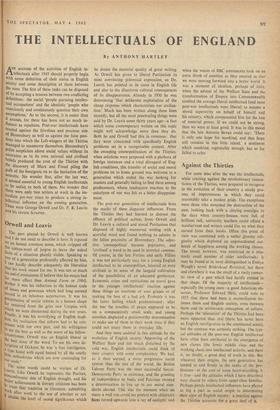Orwell and Leavis
The part played by Orwell is well known and I do not need to describe it here. It reposed O an honest common sense, which stripped off the cotton-wool of jargon to leave the naked facts of a situation plainly visible. Speaking as one of a generation profoundly affected by him, ' can hardly describe adequately the liberation that his work meant for me. It was not so much his anti-Communism (I believe that his essays had far more effect than Animal Farm or 1984). Rather it was his reduction to the human scale of issues and processes which had long seemed snared in an inhuman automatism. It was his Presentation of social reform in a human shape far removed from the grim new Utopias with which we were threatened during the war years.
it was his revivifying of English tradi- tion, his realisation that reform had to be con- sonant with our own past, and his willingness to See the best as well as the worst of his fellow- countryman. Orwell was an English liberal in e best sense of the word. To use his own de- scription of Dickens, he was 'a free intelligence, type hated with equal hatred by all the smelly tittle orthodoxies which are now contending for our souls.'
The same words could be written of Dr. 1-eavis. Like Orwell he represents the Puritan, nonconformist side of English thought, and his ► haler achievement in literary criticism has been to trace that tradition in literature, submitting work after work to the test of whether or not It attains the level of moral significance which he deems the essential quality of great writing. As Orwell has given to liberal Puritanism its most convincing polemical expression, so Dr. Leavis has pointed to its roots in English life and also to the disastrous cultural consequences of its disappearance. Already in 1930 he was denouncing 'that deliberate exploitation of the cheap response which characterises our civilisa- tion.' Much has been written along these lines recently, but all the most penetrating things were said by Dr. Leavis some thirty years ago—a fact which some contemporary writers on this topic might well acknowledge more than they do. Both he and Orwell had this in common: that they were concerned with specifically English problems set in a recognisable context. After the sweeping cosmopolitanism of the Thirties, when solutions were proposed with a plethora of foreign instances and a total disregard of Eng- lish conditions, this transfer of social and moral problems on to home ground was welcome to a generation which ended the war looking for masters and generally failing to find them among predecessors, whose inadequate reaction to the cataclysm of war was felt as a bitter disappoint- ment.
The post-war generation of intellectuals bore the marks of these disparate influences. From the Thirties they had learned to distrust the efficacy of political action; from Orwell and Dr. Leavis a cultural and moral Puritanism that disposed of highly mannered writing with a scornful word and found nothing to admire in the feline preciosity of Bloomsbury. The adjec- tive `cosmopolitan' became pejorative, and 'civilised' a word to be used in inverted commas. Of course, in the late Forties and early Fifties it was not particularly easy for a young English intellectual to be cosmopolitan, leisured or even civilised in its sense of the languid cultivation of the possibilities of an educated gentleman. Economic crises and restrictions on travel gave to the younger intellectuals' reaction against these things an overtone of sour grapes or of making the best of a bad job. Probably it was the latter feeling which predominated: after the war the troubles of peace appeared to be on a comparatively small scale, and young novelists displayed a praiseworthy determination to make use of them in their work even if they could not enjoy them in everyday life.
And they were assisted in this attitude by the evolution of English society. Approving of the Welfare State and not much disturbed by the cold war, English intellectuals could think of their country with some complacency. We had, so it then seemed, a more progressive social system than the rest of the world, the British Labour Party was the most successful Social- Democratic Party in existence, and, the granting of independence to India and Pakistan showed a determination to live up to our moral stan- dards abroad. This was the moment when on many a wall one could see posters with children's faces turned upwards into a ray of sunlight, and when the voices of BBC announcers took on an extra throb of emotion as they assured us that we were moving forward into a better world It was a moment of idealism, perhaps of folly, when the advent of the Welfare State and the transformation of Empire into Commonwealth enabled the average liberal intellectual (and most post-war intellectuals were liberal) to assume a moral superiority on behalf of himself and his country, which compensated him for the loss of material power. If we could not be strong, then we were at least good. It was in this mood that the late Aneurin Bevan could say: `There is only one hope for mankind, and that hope still remains in this little island.' a sentiment which mankind, regrettably enough, has so far failed to echo.






































 Previous page
Previous page